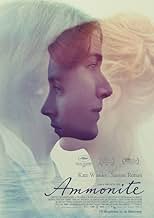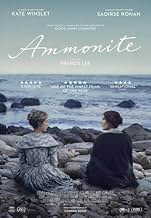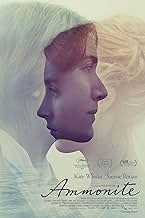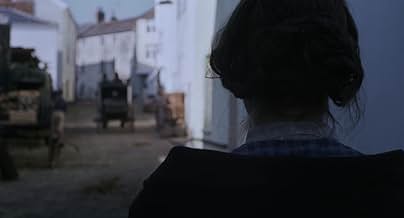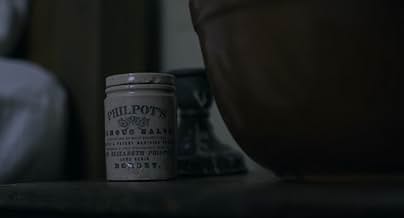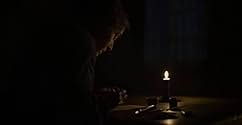IMDb-BEWERTUNG
6,5/10
25.579
IHRE BEWERTUNG
Im England der 1820er-Jahre könnten zwei Frauen unterschiedlicher nicht sein. Doch die Leidenschaft zur Archäologie eint sie. Das geht so weit, dass sie sogar eine leidenschaftliche Affäre b... Alles lesenIm England der 1820er-Jahre könnten zwei Frauen unterschiedlicher nicht sein. Doch die Leidenschaft zur Archäologie eint sie. Das geht so weit, dass sie sogar eine leidenschaftliche Affäre beginnen.Im England der 1820er-Jahre könnten zwei Frauen unterschiedlicher nicht sein. Doch die Leidenschaft zur Archäologie eint sie. Das geht so weit, dass sie sogar eine leidenschaftliche Affäre beginnen.
- Nominiert für 1 BAFTA Award
- 3 Gewinne & 32 Nominierungen insgesamt
Victoria Elliott
- Three Cups' Maid
- (as Victoria Elliot)
Robert Purdy
- Party Guest
- (as Robert J. Purdy)
Empfohlene Bewertungen
The first word that comes to mind when reviewing Ammonite is implicit. The only other review (at the time of writing) laments the lack of explicit sex scenes. There's no need for them; this is an understated love story, not a porn film. The sex scenes are few in number, but shot with delicacy and restraint. In fact, very little of this movie is explicit. An awful lot is left to the imagination of the viewer. Back stories are hinted at, touched briefly upon and only once filled in. Even the ending is left to us to imagine. Implicit, rather than explicit, is the watchword for this movie. The performances of the four female leads are in the same vein. Subtly acted throughout; never overdone. A really beautiful movie.
I put this film in the genre of Lesbian Twaddle - I can say that as I am one. I'm not sure who these films are aimed at, but that is beside the point. My main problem with this film is the misogyny and it is a big problem. Very rarely does a film make me cross, but this one did. It also makes me cross that I have only found one review that picks up on this issue. It's on a website called Paste if anyone wants to look it up. Many people question, why make up a lesbian romance for Mary Anning when there is no evidence for one, but no-one questions the misogynistic approach. I personally don't have a problem with the lesbian bit -we have been written out of history.
The initial premise of the film and main focus of the first half hour or so, it to highlight the misogyny of the scientific establishment at the time and Mr Murchison's treatment of his wife. The ultimate irony is that, Francis Lee by his portrayal of Charlotte Murchison and Elizabeth Philpot (Fiona Shaw), does both these women a great dis-service. Charlotte is portrayed as vapid and Elizabeth as some old hippy type making herbal remedies, when they were both accomplished scientists in their own right and had interesting lives. The film is misogynistic because it gives less attribution to their paleontology achievements than did the male-dominated natural history circles at the time!
Unless Francis Lee simply wants to maintain his position as prime director of LGBT films (I thought God's Own Country was excellent), I don't know why he felt the need, when Mary Anning had a very eventful life which would have made a much better film, to create a mythical lesbian romance. He would have done just as well to base a film on her brother Joseph. Rich man from London turns up in Lyme Regis with his errant son, leaves him with Joseph because he thinks a bit of sea air and hard work in the upholstery trade will turn his life around. A bit of drudgery with horsehair and cotton wadding, then sex on a pebbly beach - job done!
I gave the film six stars because it was well acted and the cinematography and costumes were excellent. However two last points that I think were huge gaffs. No-one in 1840 and who kept their own chickens would cook an addled egg or one with a chick in (it happened so fast I couldn't quite see) as eggs would be collected every day and you know if a hen has gone broody is sitting on eggs. Gone off eggs float when put in a bowl of water. Also I'm sure men did not tie their scarves in a Hoxton knot in 19th Century England - maybe on the continent but not here!
The initial premise of the film and main focus of the first half hour or so, it to highlight the misogyny of the scientific establishment at the time and Mr Murchison's treatment of his wife. The ultimate irony is that, Francis Lee by his portrayal of Charlotte Murchison and Elizabeth Philpot (Fiona Shaw), does both these women a great dis-service. Charlotte is portrayed as vapid and Elizabeth as some old hippy type making herbal remedies, when they were both accomplished scientists in their own right and had interesting lives. The film is misogynistic because it gives less attribution to their paleontology achievements than did the male-dominated natural history circles at the time!
Unless Francis Lee simply wants to maintain his position as prime director of LGBT films (I thought God's Own Country was excellent), I don't know why he felt the need, when Mary Anning had a very eventful life which would have made a much better film, to create a mythical lesbian romance. He would have done just as well to base a film on her brother Joseph. Rich man from London turns up in Lyme Regis with his errant son, leaves him with Joseph because he thinks a bit of sea air and hard work in the upholstery trade will turn his life around. A bit of drudgery with horsehair and cotton wadding, then sex on a pebbly beach - job done!
I gave the film six stars because it was well acted and the cinematography and costumes were excellent. However two last points that I think were huge gaffs. No-one in 1840 and who kept their own chickens would cook an addled egg or one with a chick in (it happened so fast I couldn't quite see) as eggs would be collected every day and you know if a hen has gone broody is sitting on eggs. Gone off eggs float when put in a bowl of water. Also I'm sure men did not tie their scarves in a Hoxton knot in 19th Century England - maybe on the continent but not here!
Ferociously slow and meandering, lacking the passion and emotion of its contemporaries and a little too long for what it bestows, which is a rather bleak and salty tale of two lost and lonely women, one of which has had her flint removed and couldn't catch light if you dosed her in kerosene and dropped her into the sun. There's always, at least, a little optimism and expectation, hope perhaps, even in the most forlorn of our turbulent times, but seemingly not here.
I just wanna point out that the scenes with no dialogue are the one's that say a lot ... Kate Winslet masters the way she talks only with her eyes.
This movie isn't for everyone, that much is clear from the mixed reviews. Some people enjoy it, others think it's an absolute bore. I fall into the first category. The movie isn't flawless but I found myself involved and captivated throughout. Personally, for me it was never too slow, but I can understand that people might feel differently. You should prepare yourself for a slow-paced, two hour long dramatic period piece.
The acting from everyone in the film is fantastic but of course in particular from the two leading ladies. Kate Winslet and Saoirse Ronan are absolutely terrific. The chemistry between them felt genuine and well-done to me, which is crucial in a romantic movie.
Only two very skilled actors could pull off the type of non-verbal communication that is often present in this move. It's nice that they don't have to share their life stories to each other in front of the camera. Their connection is deeper than basic communication. So much can be said with a glance, smile, and subtle body language. It's refreshing and surprisingly intense. Actions speak louder than words, after all.
The soundtrack is lovely and subtle, but gets intense at the exact right moments.
The cinematography fits the film perfectly.
Finally, I was intrigued by the unique concept of the movie. Ammonites, a love story between two women from very different backgrounds, the struggles of a lower class woman living with her terminally ill mother, the inequality between men and women during that time... and all of that (loosely) based on the life of a real person. Multiple interesting concepts coming together in one movie.
If you're hoping for a queer love story between two women that is happy and not a little depressing, you might want to adjust your expectations. This movie can be a bit dreary and sad. I have to admit I'm a bit tired of all the gloomy, unhappy WLW movies that exist, and still longing for a relatively happy queer movie, like a 'Love Simon' for women.
All in all, however, I did enjoy it and would probably watch it again in a few years.
The acting from everyone in the film is fantastic but of course in particular from the two leading ladies. Kate Winslet and Saoirse Ronan are absolutely terrific. The chemistry between them felt genuine and well-done to me, which is crucial in a romantic movie.
Only two very skilled actors could pull off the type of non-verbal communication that is often present in this move. It's nice that they don't have to share their life stories to each other in front of the camera. Their connection is deeper than basic communication. So much can be said with a glance, smile, and subtle body language. It's refreshing and surprisingly intense. Actions speak louder than words, after all.
The soundtrack is lovely and subtle, but gets intense at the exact right moments.
The cinematography fits the film perfectly.
Finally, I was intrigued by the unique concept of the movie. Ammonites, a love story between two women from very different backgrounds, the struggles of a lower class woman living with her terminally ill mother, the inequality between men and women during that time... and all of that (loosely) based on the life of a real person. Multiple interesting concepts coming together in one movie.
If you're hoping for a queer love story between two women that is happy and not a little depressing, you might want to adjust your expectations. This movie can be a bit dreary and sad. I have to admit I'm a bit tired of all the gloomy, unhappy WLW movies that exist, and still longing for a relatively happy queer movie, like a 'Love Simon' for women.
All in all, however, I did enjoy it and would probably watch it again in a few years.
Wusstest du schon
- WissenswertesSaoirse Ronan's favourite film growing up was Titanic (1997), so she was overjoyed to not only act in a film with Kate Winslet, but to also play her lover. Ronan said to Winslet when filming: "Who would have thought, when I was eight years old, that I'd be kissing Rose one day!"
- PatzerCharlotte is portrayed as younger than Mary, with Kate Winslet being almost twenty years older than Saoirse Ronan. In reality, Charlotte was a decade older than Mary.
- VerbindungenFeatured in Projector @ LFF: Ammonite (2020)
- SoundtracksGesellschafts - Walzer, Op. 5
Composed by Johann Strauss Sr. (as Johann Strauss Snr.)
Arranged by John Mortimer
Performed by David Juritz, Ben Hancox and James Boyd
Top-Auswahl
Melde dich zum Bewerten an und greife auf die Watchlist für personalisierte Empfehlungen zu.
Details
- Erscheinungsdatum
- Herkunftsländer
- Offizielle Standorte
- Sprachen
- Auch bekannt als
- Amonita
- Drehorte
- Lyme Regis, Dorset, England, Vereinigtes Königreich(general setting)
- Produktionsfirmen
- Weitere beteiligte Unternehmen bei IMDbPro anzeigen
Box Office
- Budget
- 10.000.000 £ (geschätzt)
- Bruttoertrag in den USA und Kanada
- 160.930 $
- Eröffnungswochenende in den USA und in Kanada
- 87.552 $
- 15. Nov. 2020
- Weltweiter Bruttoertrag
- 1.109.287 $
- Laufzeit
- 1 Std. 57 Min.(117 min)
- Farbe
- Seitenverhältnis
- 1.85 : 1
Zu dieser Seite beitragen
Bearbeitung vorschlagen oder fehlenden Inhalt hinzufügen







